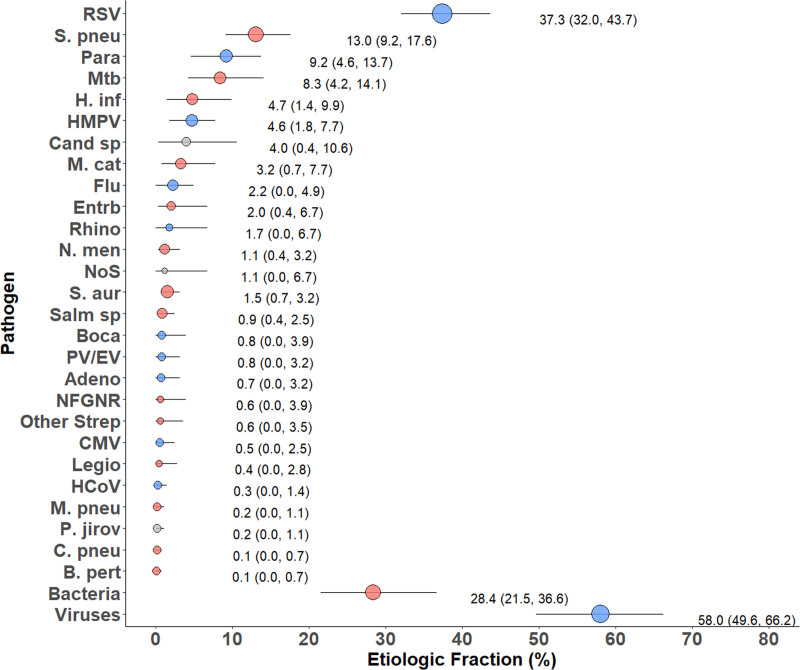FIGURE 3.
Integrated etiology results, CXR+ cases. Other Strep includes Streptococcus pyogenes and Enterococcus faecium. NFGNR includes Acinetobacter species and Pseudomonas species. Enterobacteriaceae includes Escherichia coli, Enterobacter species and Klebsiella species, excluding mixed Gram-negative rods. CXR+ defined as consolidation and/or other infiltrate on chest radiograph. Bacterial summary excludes Mtb. Pathogens that were estimated at the subspecies level but grouped to the species level for display include Parainfluenza virus type 1, 2, 3 and 4; S. pneumoniae PCV 13 and S. pneumoniae non-PCV 13 types; H. influenzae type b and H. influenzae non-type b; and influenza A, B and C. Etiologic fraction estimates, including subspecies and serotype disaggregation (eg, PCV-13 type and non-PCV-13 type), are given in Supplemental Digital Content 6, http://links.lww.com/INF/E2. Line represents the 95% credible interval. The size of the symbol is scaled on the basis of the ratio of the estimated etiologic fraction to its standard error. Of 2 identical etiologic fraction estimates, the estimate associated with a larger symbol is more informed by the data than the priors. Adeno indicates adenovirus; B. pert, Bordetella pertussis; Boca, human bocavirus; C. pneu, Chlamydophila pneumoniae; Cand sp., Candida species; CMV, cytomegalovirus; Entrb, enterobacteriaceae; Flu, influenza virus A, B and C; H. inf, Haemophilus influenzae; HCoV, coronavirus; HMPV, human metapneumovirus A/B; Legio, Legionella species; M. cat, Moraxella catarrhalis; M. pneu, Mycoplasma pneumoniae; Mtb, Mycobacterium tuberculosis; NFGNR, nonfermentative Gram-negative rods; N. men, Neisseria meningitidis; NoS, not otherwise specified (ie, pathogens not tested for); P. jirov, P. jirovecii; Para, parainfluenza virus types 1, 2, 3 and 4; PV/EV, parechovirus/enterovirus; Rhino, human rhinovirus; RSV, respiratory syncytial virus A/B; S. aur, Staphylococcus aureus; S. pneu, Streptococcus pneumoniae; Salm sp, Salmonella species.

